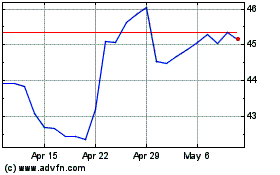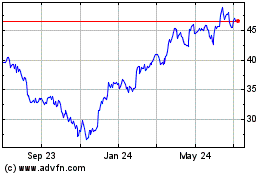In China, Western Auto Makers Temper Ambitions -- WSJ
April 26 2016 - 3:04AM
Dow Jones News
Slowing market gains after rapid expansion lead to subdued tone
at Beijing motor show
BEIJING -- After years of trumpeting their advance in China,
global car makers are now sounding a more cautious note over the
world's largest auto market.
While they expect the market to continue growing, albeit at a
slower pace, auto executives gathering at the Beijing motor show
admit that risks are increasing. Car prices are dropping, sales
growth is sliding and the government is getting stricter on
emissions regulation.
Toyota Motor Corp. said it is uncertain about hitting a target
it set itself two years ago to sell two million cars in China by
2025. "Since then we've seen additional requirements coming up for
fuel efficiency and emissions on the regulator side," said Hiroji
Onishi, head of Toyota's China region. "We are reconsidering our
product lineup and trying to come up with a plan that will enable
us to secure the volumes and profit as well."
Four years ago Ford Motor Co. unveiled an ambitious plan to
double its production capacity in China by 2015. This year there is
"nothing that we're ready to talk about" in terms of further
expansion, said Mark Fields, chief executive of the Dearborn,
Mich.-based manufacturer.
And Volkswagen AG last year said with fanfare that it would
invest 22 billion euros ($24.7 billion) in China in the coming five
years and raise production capacity by 40% to five million
cars.
"We are generally staying on the plans, although some things are
coming a little bit later," said Jochem Heizmann, chief executive
and president of Volkswagen AG in China.
The shift in tone emphasizes that the easy times are over in the
Chinese auto market. Global auto makers have been some of the
biggest beneficiaries of Chinese consumers' appetite to spend.
Booming double-digit percentage growth was common for global auto
makers in the last decade in China.
However, as China's economic growth cools, industries ranging
from coal, steel to shipping have been struggling with insufficient
demand. In the first quarter of 2016, auto sales rose just 6% from
a year earlier.
The single-digit percentage gain came even as China cut by half
a purchase tax on small-engine vehicles, which make up more than
two thirds of the country's new car sales. Analysts have cautioned
that demand for those vehicles could stall after the policy expires
at the end of this year. Volkswagen's Mr. Heizmann warned that the
tax break's scheduled expiration will have a "negative" impact on
the industry next year.
Ford expects China will sell a total of 23.5 million to 25.5
million vehicles this year, up 3.7% on 2015. Toyota said it is
aiming to sell 1.15 million cars in China this year, largely
unchanged from the volumes it sold last year. General Motors Co.
has forecast low-single-digit market growth each year up to
2020.
Global auto makers are particularly sensitive to slowing Chinese
growth because they derive a significant amount of their revenue
from the country, after years of aggressive expansion. China
accounts for 37% of GM's global vehicle sales, 36% of Volkswagen's,
and 17% of Ford's, according to corporate filings.
The companies have built more plants in China than anywhere else
since 2008. Now they could be confronted with too many factories
and not enough buyers.
One of GM's joint ventures in China -- Beijing requires foreign
companies to build cars with local partners -- saw its utilization
rate fall to 113% last year from 137% the year before. Over the
same period one of Volkswagen's joint ventures saw its rate fall to
115% from 132%, according to their partners' financial statements.
Car makers reap profits if their factories run near 100% of
capacity, but losses mount if the utilization rate falls below
80%.
Ford's top executives said by the end of this year it would have
a manufacturing capacity of 2.1 million vehicles in China, almost
double its sales volumes last year in the country. Citing fierce
competition, John Lawler, chief executive of Ford China, said China
is starting to look like "a mature market."
As car prices remain under pressure, global auto makers said
they would focus more on profitability than sales volumes.
According to a research by Sanford C. Bernstein, combined pretax
profits posted by China's major car makers fell 1.1% year-over-year
in 2015.
"Sales performance is not our only target," said Mr. Heizmann.
"We are not following every price reduction. We have to take into
account the long-term profitability as well as the interest of our
customers."
Ford chief executive Mr. Fields sounded a similar note. "Running
a profitable business takes higher priority than blindly going
after a sales target or market share," he said.
--Rose Yu
(END) Dow Jones Newswires
April 26, 2016 02:49 ET (06:49 GMT)
Copyright (c) 2016 Dow Jones & Company, Inc.
General Motors (NYSE:GM)
Historical Stock Chart
From Mar 2024 to Apr 2024

General Motors (NYSE:GM)
Historical Stock Chart
From Apr 2023 to Apr 2024
